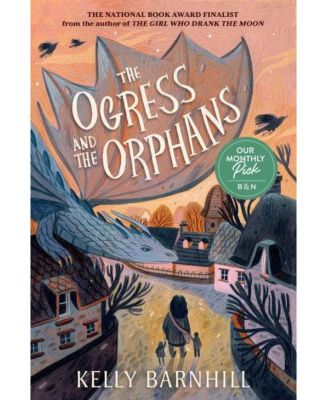The Ogress and the Orphans by Kelly Barnhill
Product details
Web ID: 17452549I don't usually read kids' books-I'm glad I did!
I don't read a lot of books written for middle-school or younger kids. This book convinces me that maybe I need to start! The story is told in a "folksy" manner, told by an unknown narrator who is actually a bit player in the story. We don't find out "who" the narrator is until the end. We're told the history of the town of Stone-in-the-Glen. The town was once a wonderful place to live. People respected and looked after each other as friends and neighbors. The library was the center of town, and folks often gathered in the town square and at the library, to discuss the ideas and the stories they had read. There were abundant trees, and the entire town was a pastoral paradise. They helped each other when some were facing hard times, and lived life as if strangers are only neighbors you haven't met yet. I want to live there! But a dragon appeared in the town one day and burned the library to the ground. Some raced in and out of the burning building, saving all of the books they could carry--giving them a new home in their houses--until the library could be rebuilt. Then the school was also burned down by a dragon. Was it the same one? Why was the dragon doing these things? Then even the trees were burned by a dragon. One day a man appeared, telling the townsfolk that he was a dragon-slayer, and only HE could save the town from more destruction. He bragged about the number of dragons he had slain. He also encouraged the people to elect him as mayor--so he could continue to protect them. Once elected, all seemed to be enthralled with their new mayor. When he told them in his frequent speeches, that only HE could save them, they believed him. When he told them that they should only look out for themselves, because their neighbors were jealous of what they had, and would probably steal from them if they weren't vigilant, they all went home and began locking their doors against each other. When they asked about rebuilding the library and the school, he explained to them that they needed to give him all of their money, so he could over-see the rebuilding. But when he never got around to building anything except more fear and distrust among them, they still remained dazzled by his frequent speeches. The 15 orphans live in an orphanage run by the town, but the donations to it have dried up now that everyone is giving all they own to the mayor only. The caretakers of the children are very old. Myron still bears the scars from his running in and out of the library to save whatever books he could carry out--they're now in the room upstairs, where the older children go for some privacy, and to read, since there isn't a school to educate them. The oldest orphan is a 13-year-old girl, who is horrified to overhear at the monthly town market, where they try to sell soap and canned preserves, that orphans have to leave the orphanage once they turn 14. The story of the Ogress involves her having lived in many places during her thousand or so years of life. One place was a town of ogres. But their town was destroyed by an ogre that appeared among them and promised to save them from a dragon that kept burning down places in their town. He encouraged them to mistrust each other and to protect themselves from the thievery of other ogres. The ogres eventually destroyed what was left of their town, and the Ogress had to move on. She has always wanted to belong somewhere, and to find others to be her friends and neighbors. The crows play an integral role in the story, as do the cats, many of whom sit in a ring around the palace of the mayor, watching, always watching, and waiting--but for what? Some of the children are fluent in "crow," and the crows are delighted. The Ogress does her best to communicate with the crows--as well as the sheep she takes in, along with an old, blind dog--when she moves to an abandoned farmhouse outside of Stone-in-the-Glen. The main action takes place when one of the orphans decides that since there isn't enough food for all of them, that she needs to leave, to give up her share for the good of everyone else. The caretakers are frantic, and the townspeople become convinced the child has been stolen by the ogress--a notion their mayor encourages. This sweet allegory is told in short sentences and paragraphs, with a lot of description and magical interactions between various species. As an adult, I could see where the story was heading, but I was so caught up in the story of the people I cared about, that I read this book in two sittings. I'm off to pursue other books by this author--who has also written a few books for adult.
Recommends this product

Customer review from barnesandnoble.com

